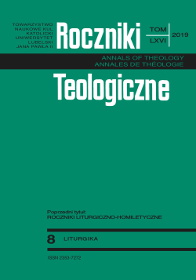Misterium Eucharystii w świetle katechez z Agendy ks. Hieronima Powodowskiego a echa Soboru Trydenckiego
Mystery of the Eucharist in the Light of Catecheses from the Agenda of Fr. Hieronim Powodowski and Echoes of the Concil of Trent
Author(s): Waldemar PałęckiSubject(s): Christian Theology and Religion, Theology and Religion, Pastoral Theology
Published by: Towarzystwo Naukowe KUL & Katolicki Uniwersytet Lubelski Jana Pawła II
Keywords: Eucharist; sacrifice; Holy Communion; agenda; Council of Trent
Summary/Abstract: The Council of Trent undertook the task of presenting the doctrine of the Eucharist, especially in confrontation with the teaching of dissenters. This reflection was systematically included in the council decrees adopted at sessions in 1551 and 1562. At the pastoral level, this teaching, as an aid for priests, was included in the Roman Catechism, published in 1566. According to the teaching of the Council of Trent, catecheses were included in Polish agendas, which were to help the faithful not only understand the theological depth of the sacraments, but also had a parenetic character. An example are catecheses on the Eucharist on the agenda of Fr. Hieronim Powodowski.Biblical texts, both Old Testament images and New Testament events, were an important foundation in the Powodowski’s catecheses on the Eucharist. It is worth emphasizing the presentation of the Eucharist in the light of the whole history of salvation—from the creation of the world to the apogee in the mystery of Redemption. Christ’s call: “do this in remembrance of me” has been realized in the Church since the beginning of Christianity. This sacrament was seen as the source of all sacraments. The essential content of this approach is the fact that Christ is really present in the mystery of the Eucharist. Accepting this truth requires an attitude of faith in the real presence of Christ in Mass. It assumes an attitude of faith in transubstantiation, emphasizing the importance of the Eucharist as a sacrifice. Preparing the faithful to receive Holy Communion was a separate issue. Attention was drawn to the need for sacramental confession in the case of grave sins. At the same time, the Eucharist protects against grave sins, forgives venal sins, strengthens faith, hope and love, while maintaining piety. Therefore, humbleness and repentance were required, following the example of the Gospel centurion, and they were advised not to absentmindedly. A historical look at the mystery of the Eucharist will certainly contribute to the deepening of Eucharistic awareness among the faithful and will contribute to full, conscious and active participation in the Holy Mass.
Journal: Roczniki Teologiczne
- Issue Year: 66/2019
- Issue No: 8
- Page Range: 91-110
- Page Count: 20
- Language: Polish

